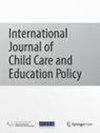Infant feeding nutrition policies in Australian early childhood education and care services: a content and qualitative analysis
IF 1.8
Q2 EDUCATION & EDUCATIONAL RESEARCH
International Journal of Child Care and Education Policy
Pub Date : 2018-11-03
DOI:10.1186/s40723-018-0053-2
引用次数: 0
Abstract
Early infant feeding practices are a critical part of education and care programs within Early Childhood Education and Care (ECEC) settings. With an increasing number of children attending ECEC services from a young age, adherence to best practice infant feeding will improve long-term health outcomes. This paper uses inductive and deductive thematic analysis informed by Social Cognitive Theory and inductive content analysis, to describe Australian infant feeding nutrition ECEC policy environments. Key Australian ECEC policy documents were analysed, revealing the invisibility of infants generally, and infant feeding specifically, in current quality standards. This was followed by analysis of 28 nutrition or infant feeding policies from 19 centre- and home-based ECEC services impacting over 1500 children in Queensland Australia. Five key themes characterising the content of service policies impacting infant feeding emerged: documentation, values, curriculum and pedagogy, supportive environments, and working in partnerships with parents. Service policies are required by legislation and set the foundation for a safe, supportive environment for infant feeding. The lack of infant feeding practice examples and invisibility of infants in legislation increase ambiguity, and health and safety risks. Opportunities exist to adopt separate infant feeding policies which will assist the provision of quality practice for the short-term and long-term optimal health of infants in ECEC settings.澳大利亚幼儿教育和保育服务中的婴儿喂养营养政策:内容和定性分析
婴儿早期喂养方法是幼儿教育和保育(ECEC)机构中教育和保育计划的重要组成部分。随着越来越多的儿童从小开始接受幼儿教育和保育服务,坚持婴儿喂养的最佳做法将改善长期的健康状况。本文以社会认知理论和归纳式内容分析为基础,采用归纳式和演绎式主题分析法来描述澳大利亚婴儿喂养营养ECEC政策环境。对澳大利亚幼儿保育和教育政策的主要文件进行了分析,揭示了当前质量标准中对婴儿以及婴儿喂养的忽视。随后,对澳大利亚昆士兰州 19 家中心和家庭幼儿保育和教育服务机构的 28 项营养或婴儿喂养政策进行了分析,这些政策对 1500 多名儿童产生了影响。结果发现,影响婴儿喂养的服务政策内容有五个关键主题:文件、价值观、课程和教学法、支持性环境以及与家长合作。服务政策是法律规定的,为婴儿喂养奠定了安全、支持性环境的基础。由于缺乏婴儿喂养实践范例,以及立法中对婴儿的忽视,增加了模糊性以及健康和安全风险。采取单独的婴儿喂养政策的机会是存在的,这将有助于在幼儿保育和教育机构中为婴儿的短期和长期最佳健康提供优质做法。
本文章由计算机程序翻译,如有差异,请以英文原文为准。
求助全文
约1分钟内获得全文
求助全文
来源期刊

International Journal of Child Care and Education Policy
EDUCATION & EDUCATIONAL RESEARCH-
CiteScore
3.10
自引率
0.00%
发文量
10
审稿时长
13 weeks
 求助内容:
求助内容: 应助结果提醒方式:
应助结果提醒方式:


